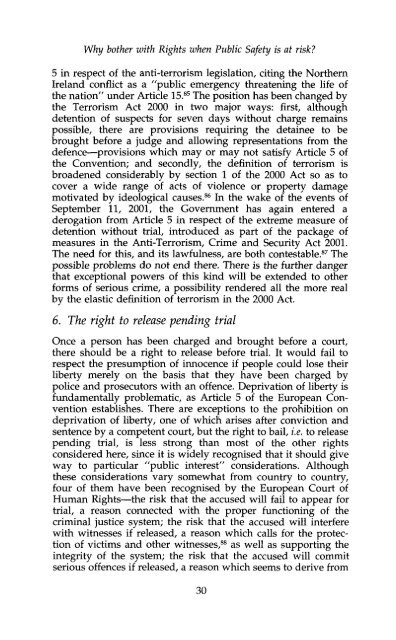Human Rights, Serious Crime and Criminal Procedure - College of ...
Human Rights, Serious Crime and Criminal Procedure - College of ...
Human Rights, Serious Crime and Criminal Procedure - College of ...
- No tags were found...
You also want an ePaper? Increase the reach of your titles
YUMPU automatically turns print PDFs into web optimized ePapers that Google loves.
Why bother with <strong>Rights</strong> when Public Safety is at risk?5 in respect <strong>of</strong> the anti-terrorism legislation, citing the NorthernIrel<strong>and</strong> conflict as a "public emergency threatening the life <strong>of</strong>the nation" under Article 15. 85 The position has been changed bythe Terrorism Act 2000 in two major ways: first, althoughdetention <strong>of</strong> suspects for seven days without charge remainspossible, there are provisions requiring the detainee to bebrought before a judge <strong>and</strong> allowing representations from thedefence—provisions which may or may not satisfy Article 5 <strong>of</strong>the Convention; <strong>and</strong> secondly, the definition <strong>of</strong> terrorism isbroadened considerably by section 1 <strong>of</strong> the 2000 Act so as tocover a wide range <strong>of</strong> acts <strong>of</strong> violence or property damagemotivated by ideological causes. 86 In the wake <strong>of</strong> the events <strong>of</strong>September 11, 2001, the Government has again entered aderogation from Article 5 in respect <strong>of</strong> the extreme measure <strong>of</strong>detention without trial, introduced as part <strong>of</strong> the package <strong>of</strong>measures in the Anti-Terrorism, <strong>Crime</strong> <strong>and</strong> Security Act 2001.The need for this, <strong>and</strong> its lawfulness, are both contestable. 87 Thepossible problems do not end there. There is the further dangerthat exceptional powers <strong>of</strong> this kind will be extended to otherforms <strong>of</strong> serious crime, a possibility rendered all the more realby the elastic definition <strong>of</strong> terrorism in the 2000 Act.6. The right to release pending trialOnce a person has been charged <strong>and</strong> brought before a court,there should be a right to release before trial. It would fail torespect the presumption <strong>of</strong> innocence if people could lose theirliberty merely on the basis that they have been charged bypolice <strong>and</strong> prosecutors with an <strong>of</strong>fence. Deprivation <strong>of</strong> liberty isfundamentally problematic, as Article 5 or the European Conventionestablishes. There are exceptions to the prohibition ondeprivation <strong>of</strong> liberty, one <strong>of</strong> which arises after conviction <strong>and</strong>sentence by a competent court, but the right to bail, i.e. to releasepending trial, is less strong than most <strong>of</strong> the other rightsconsidered here, since it is widely recognised that it should giveway to particular "public interest" considerations. Althoughthese considerations vary somewhat from country to country,four <strong>of</strong> them have been recognised by the European Court <strong>of</strong><strong>Human</strong> <strong>Rights</strong>—the risk that the accused will fail to appear fortrial, a reason connected with the proper functioning <strong>of</strong> thecriminal justice system; the risk that the accused will interferewith witnesses if released, a reason which calls for the protection<strong>of</strong> victims <strong>and</strong> other witnesses, 88 as well as supporting theintegrity <strong>of</strong> the system; the risk that the accused will commitserious <strong>of</strong>fences if released, a reason which seems to derive from30
















